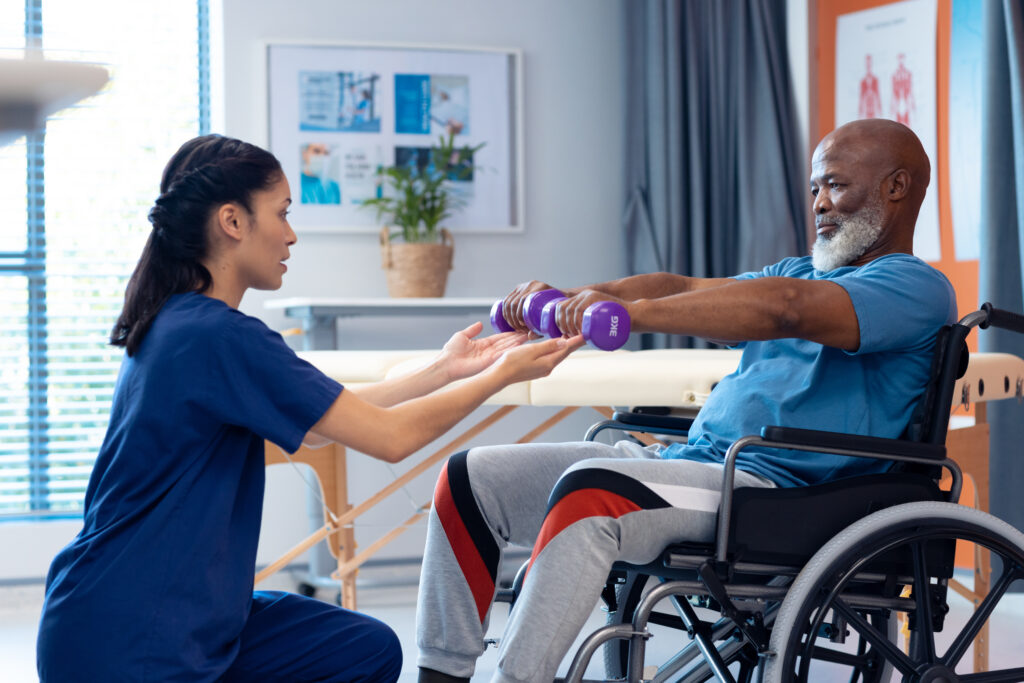The 2025 update to the UK’s Duchenne Muscular Dystrophy (DMD) care guidelines marks a pivotal advancement in delivering timely, structured, and multidisciplinary support for individuals living with this progressive neuromuscular disorder. These therapy-specific recommendations are critical for physiotherapists and occupational therapists supporting patients with DMD across their lifespan from early diagnosis to adulthood.
This blog aims to highlight the key updates in the 2025 DMD care guidelines and explore how physiotherapy and occupational therapy professionals can integrate them into daily practice. It also outlines collaborative strategies to enhance patient independence, quality of life, and functional outcomes.
Understanding Duchenne Muscular Dystrophy (DMD)
Duchenne Muscular Dystrophy (DMD) is a genetic disorder caused by mutations in the dystrophin gene, resulting in the absence of dystrophin (a protein essential for maintaining muscle strength and stability). This deficiency causes progressive muscle wasting, impacting skeletal, respiratory, and cardiac muscle systems.
Symptoms typically appear between the ages of 2 and 5, with early signs including delayed walking, difficulty climbing stairs, frequent falls, and muscle weakness. As the disease progresses, individuals experience increasing mobility challenges, bone fragility, contractures, and eventual respiratory and cardiac complications. By adulthood, most individuals with DMD require wheelchairs, respiratory support, and psychosocial care.
Key Updates in the 2025 DMD Care Guidelines
The 2025 DMD care guidelines introduce crucial updates for physiotherapists and occupational therapists working with individuals with DMD. These updates include:
1. Proactive, Preventative Treatment
The guidelines prioritise early diagnosis and intervention to delay disease progression. Therapists are encouraged to initiate muscle-strengthening and respiratory support exercises early and maintain range of motion through regular therapy.
2. Expanded Use of Assistive Technology
Increased integration of orthotics, robotic mobility aids, and assistive devices helps preserve independence as the disease progresses. Orthoses and splints are essential tools to prevent contractures and support daily living activities.
3. Updated Outcome Measures
Tools such as the North Star Ambulatory Assessment (NSAA) are emphasised for tracking physical function in children and adolescents with DMD. These measures help clinicians tailor interventions and monitor disease progression accurately.
Why the 2025 Update Matters
These standards shift focus from reactive to preventative DMD care, improving outcomes through structured care plans, early detection of complications, and whole-person support. This is crucial for:
- Enhancing quality of life for people living with Duchenne muscular dystrophy.
- Supporting outpatient, home-based, and primary care services.
- Ensuring consistency and alignment across all areas of care involved in therapy and rehabilitation.

Occupational Therapy’s Role in DMD Care According to the 2025 Standards
Occupational therapy has a crucial role in improving daily functioning and independence for individuals living with DMD. The 2025 guidelines emphasise the importance of:
- Adaptive Equipment: Early introduction of devices such as splints, orthotics, and assistive technology to support activities of daily living (ADLs) like dressing, feeding, and personal care.
- Home and School Modifications: Occupational therapists collaborate with families and schools to create environments that support continued mobility and independence. This may include home modifications, such as ramps or adapted bathrooms, and ensuring that educational settings are accessible for children with Duchenne.
- Cognitive-Behavioural Strategies: Emotional well-being is a priority, and OT professionals focus on strategies that help individuals cope with the emotional and psychological challenges of living with DMD.
Physiotherapy’s Role in DMD Care According to the 2025 Standards
The updated guidelines place a strong emphasis on physical therapy protocols to manage muscle weakness, respiratory function, and contracture prevention. Key interventions include:
- Strength and Flexibility Exercises: Focus on maintaining muscle strength and range of motion, as well as preventing muscle wasting and contractures.
- Breathing Exercises: Given the respiratory challenges that arise with progressive muscle weakness, aerobic exercises and respiratory support are critical components of physiotherapy for people with DMD.
- Use of Assistive Devices: Physiotherapists work with the multidisciplinary team to provide recommendations on mobility aids like wheelchairs and walking devices. These aids help maintain mobility for as long as possible.

Collaborative Approach Between Physiotherapy and Occupational Therapy
A multidisciplinary team (MDT) approach is key to delivering comprehensive care for individuals with Duchenne. Physiotherapists and occupational therapists collaborate on a variety of fronts, including:
- Mobility Aids: Working together to assess the best devices to maintain function and independence.
- Joint Mobility: Collaborative care to maintain joint function and muscle health, ensuring that both therapy care teams support each other’s treatment plans.
- Psychosocial Support: Addressing mental health concerns and facilitating emotional support for individuals and families.
Physiotherapists and occupational therapists should also collaborate with neuromuscular specialists, speech and language therapists, and social care professionals to ensure coordinated care, communication support, and access to essential health and social services.
Conclusion
The 2025 standards of care for Duchenne Muscular Dystrophy highlight the importance of early intervention, proactive treatment, and multidisciplinary collaboration. Physiotherapists and occupational therapists must stay up to date with these guidelines to deliver the highest standard of care to individuals living with DMD. By integrating these new practices into therapy plans, we can enhance quality of life and better manage the progression of this challenging condition.
Join our team and make a difference.
At Verovian Allied Health Professional Recruitment Agency, we offer rewarding roles for physiotherapists and occupational therapists, with access to professional growth and impactful work. Explore jobs now and help improve lives.





